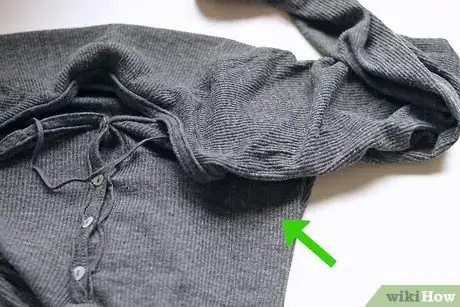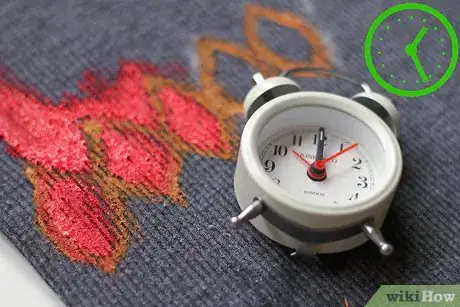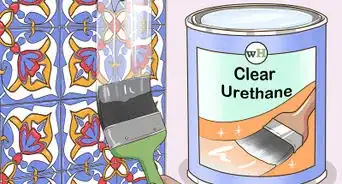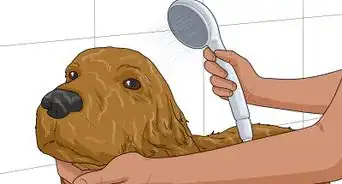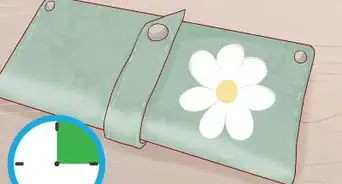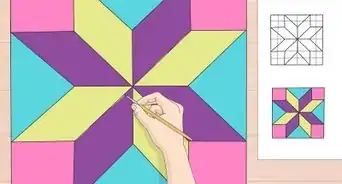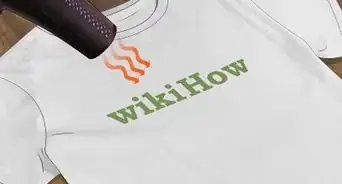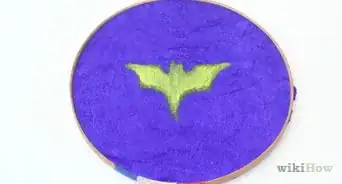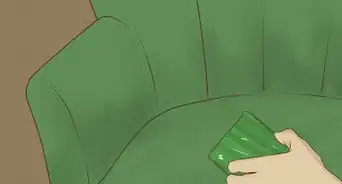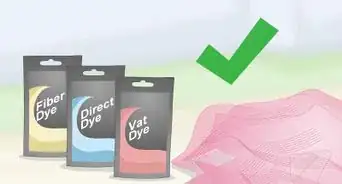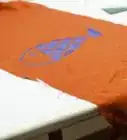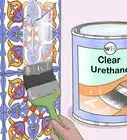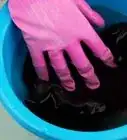This article was co-authored by Joy Cho. Joy Cho is the Founder and Creative Director of the lifestyle brand and design studio, Oh Joy!, founded in 2005 and based in Los Angeles, California. She has authored six books and consulted for creative businesses around the world. Joy has lectured on business, leadership, and entrepreneurship at conferences and companies such as AltSummit, Pinterest, Target, and Hallmark, while her home and studio have been featured in magazines such as House Beautiful, Parents, and Domino. She has also been named one of Time's 30 Most Influential People on the Internet multiple times and has the most followed account on Pinterest with more than 14 million followers.
wikiHow marks an article as reader-approved once it receives enough positive feedback. This article received 11 testimonials and 93% of readers who voted found it helpful, earning it our reader-approved status.
This article has been viewed 605,311 times.
Fabric painting is a great way to add new life to plain old t-shirts, boring upholstery, or any bland fabric that needs a boost. Mastering the art of fabric painting allows you to become your own fashion or interior designer by painting your ideas into existence. Learn to develop a design, trace it onto any piece of fabric, and paint away using the simple steps below.
Steps
Prepping Your Fabric
-
1Select your fabric. Washable natural-fiber and natural-blend fabrics with 50/50 cotton/polyester blends work best for fabric painting.
-
2Wash your fabric to prevent unwanted shrinkage after you apply the paint. Use only regular laundry detergent and do not use fabric softener when drying.[1]Advertisement
-
3Place a barrier between the front and back layers of the fabric. You can use a large clipboard, smooth cardboard, or waxed paper in between the two sides to prevent the paint from bleeding.[2]
-
4Pin the fabric in place using safety pins or sewing pins. Place one pin in each corner to prevent the material from shifting.[3]
Choosing Your Materials
-
1Choose fabric paint from a bottle to achieve precise, textured lines. Hold the bottle like a pencil as you squeeze gently to release the paint. Be sure to touch the tip of the bottle directly to the fabric so that the paint adheres to the fabric surface.
-
2Alternately, purchase fabric paint that you can apply with paint brushes. This type of fabric paint allows you to mix and alter colors before adhering the paint to the fabric.[4]
-
3Choose paint brushes according to the effect you want to create with your brush strokes.
- Flat shader brushes have a chiseled edge that allows you to paint clean lines and fill in large spaces.
- Liner brushes are long or short tapered and are ideal for making long brush strokes.
- Scrubber brushes are composed of tapered bristles perfect for blending color and creating short, rough strokes.
Painting Your Fabric
-
1Draw out your desired design on a piece of paper using a pencil. It is helpful to try out different color combinations on this template before transferring it to your fabric.[5]
-
2Use a pencil or a disappearing ink pen to transfer your design to your fabric. For dark fabrics, you can use a white chalk pencil to trace your design.
- Opt for tracing a stencil if you want to follow a precise, pre-made pattern or picture. Tape your stencil down with masking tape to prevent it from moving.
- You can also free-form draw on your fabric before you paint if you are confident enough in your artistic ability.
-
3Switch to the painting tool of your choice and paint over the image that you just traced. Be sure to cover the outline with paint so that it doesn't show through.
-
4To create a watercolor look, mix your paint color with water until it is the thickness of writing ink. Dip a relatively thin brush in the mixture and paint brush strokes in a horizontal motion.
- Spray water lightly on the fabric surface using a mister bottle after painting to allow the brush strokes to bleed lightly while switching between colors.
- If the paint begins to bleed too much or too quickly, grab a hair dryer and dry the spot to stop the process. A hair dryer can also be used to dry fabric paint faster after finishing the work.
-
5To airbrush a stencil, use fabric spray paint. Fabric spray paint dries more quickly than other types of fabric paint and allows you to easily fill in intricate stencils.
-
6To create texture, use a combing tool. You can add variation and create depth simply by combing paint in small sections. Be careful not to blend undesirable colors together.
-
7Once you've finished your design, let the paint dry for 24 hours and do not wash your fabric for 72 hours after painting.
Adding Embellishments
-
1Make your fabric sparkle with glitter. Simply sprinkle the glitter of your choice on top of the paint while it is still wet. Allow the paint to dry fully.
-
2Add three-dimensional embellishments like rhinestones and buttons. Adhere to the fabric using a small dollop of fabric paint that matches the color of the embellishment. If the fabric paint does not seem strong enough, try fabric glue.[6]
-
3Cut a design out of a sponge using scissors and dip the soft side lightly into fabric paint. Be sure to press down firm and straight.
Expert Q&A
Did you know you can get expert answers for this article?
Unlock expert answers by supporting wikiHow
-
QuestionDo I need to dilute fabric paint for stenciling?
 Joy ChoJoy Cho is the Founder and Creative Director of the lifestyle brand and design studio, Oh Joy!, founded in 2005 and based in Los Angeles, California. She has authored six books and consulted for creative businesses around the world. Joy has lectured on business, leadership, and entrepreneurship at conferences and companies such as AltSummit, Pinterest, Target, and Hallmark, while her home and studio have been featured in magazines such as House Beautiful, Parents, and Domino. She has also been named one of Time's 30 Most Influential People on the Internet multiple times and has the most followed account on Pinterest with more than 14 million followers.
Joy ChoJoy Cho is the Founder and Creative Director of the lifestyle brand and design studio, Oh Joy!, founded in 2005 and based in Los Angeles, California. She has authored six books and consulted for creative businesses around the world. Joy has lectured on business, leadership, and entrepreneurship at conferences and companies such as AltSummit, Pinterest, Target, and Hallmark, while her home and studio have been featured in magazines such as House Beautiful, Parents, and Domino. She has also been named one of Time's 30 Most Influential People on the Internet multiple times and has the most followed account on Pinterest with more than 14 million followers.
Designer & Style Expert, Oh Joy!
-
QuestionWhat are some fun projects I can use fabric paint for?
 Joy ChoJoy Cho is the Founder and Creative Director of the lifestyle brand and design studio, Oh Joy!, founded in 2005 and based in Los Angeles, California. She has authored six books and consulted for creative businesses around the world. Joy has lectured on business, leadership, and entrepreneurship at conferences and companies such as AltSummit, Pinterest, Target, and Hallmark, while her home and studio have been featured in magazines such as House Beautiful, Parents, and Domino. She has also been named one of Time's 30 Most Influential People on the Internet multiple times and has the most followed account on Pinterest with more than 14 million followers.
Joy ChoJoy Cho is the Founder and Creative Director of the lifestyle brand and design studio, Oh Joy!, founded in 2005 and based in Los Angeles, California. She has authored six books and consulted for creative businesses around the world. Joy has lectured on business, leadership, and entrepreneurship at conferences and companies such as AltSummit, Pinterest, Target, and Hallmark, while her home and studio have been featured in magazines such as House Beautiful, Parents, and Domino. She has also been named one of Time's 30 Most Influential People on the Internet multiple times and has the most followed account on Pinterest with more than 14 million followers.
Designer & Style Expert, Oh Joy!
-
QuestionCan I use acrylic paints on fabric?
 Community AnswerThe acrylic paint will make your fabric thick and stiff and cause the t-shirt to lose elasticity. But, you can mix rubbing alcohol with acrylic paint to create fabric paint or you can also use white school glue and shaving gel mixed with acrylic paint to create fabric paint. Do not mix both methods together!
Community AnswerThe acrylic paint will make your fabric thick and stiff and cause the t-shirt to lose elasticity. But, you can mix rubbing alcohol with acrylic paint to create fabric paint or you can also use white school glue and shaving gel mixed with acrylic paint to create fabric paint. Do not mix both methods together!
Things You'll Need
- 50/50 cotton/polyester fabric
- Fabric paint (bottle, brush, or spray)
- Paint brushes in desired variations
- Cardboard, clipboard, or waxed paper for a barrier
- Safety or sewing pins
- Pencil, disappearing ink pen, or white chalk pencil
- Embellishments of your choice (optional)
References
About This Article
If you want to paint fabric, draw your design on the material with a pencil or white chalk. Using a paintbrush or a squeeze bottle with a pointed tip, apply the paint so it covers the outline of your design. If you want to create a watercolor look, mix your paint color with water and brush it on in a horizontal motion, or drag a combing tool through the paint to get a textured look. Allow the paint to dry for 24 hours and do not wash the fabric for 72 hours so the paint can fully set. If you want to learn how to add glitter or rhinestones to your fabric paint, keep reading the article!
